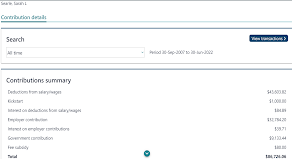Is there a downside to offsetting someone elses mortgage? How do I ask someone to offset my mortgage with their bank account? How does it all work?
I had a question on my blog regarding having other people offset your mortgage with their bank accounts. So I thought today I would clarify.
Talk to the people who have money in their account, usually these would be members of your family, either those that are saving up for something, or those who have paid off their mortgages and have a little nest egg.
They will have it in a fixed deposit somewhere, earning a small amount of interest. Have a conversation and find out how much interest they are earning per annum, not the percentage but the amount of money. Also, have a look at the interest you would be paying on that amount to the bank. Do the maths and make sure it works out for both of you. Here is an example that I worked out using today's interest rates for both fixed term deposits and mortgage accounts.
If you have a $100,000 revolving credit mortgage you have taken off a fixed mortgage.
You would have paid, at today's rate, around $300/ftnt on that amount for 30 years. ie. paying the bank $300 x 26ftnts x 30 years which equals $232,290. One of those massive figures it doesn't bear thinking about really, but it is just our lives as mortgage holders. Let's try to improve that if we can.
If we work backwards, using their money to offset, you will be paying 2/3 of the variable interest rate (by putting the $30,000 to offset the $100,000 debt)
You will be paying $300 per fortnight for about 20 years 5 mths, so $300 x 26ftnts x 9.5years you don't have to pay, which is a saving of $74,100
Let's divide that by 30 years, then you save $2470p/a
You could pay them the same amount as the bank does of $1232p/a out of your $2470p/a and still be $1,238 or over $100 per month better off. This works out at $23 per week you need to pay them.
Also, because you are paying them it means that the amount they are offsetting your mortgage increases.
It means you are removing the middle man (the bank) and being better off because of it.
I know it sounds really confusing but it truly works well for both parties.
It works best when you negotiate a good variable interest rate with the bank and make it a long term mortgage. Treat this type of mortgage as an overdraft facility. The point is not to pay it off quickly (which is the goal with a fixed interest rate mortgage) but never pay interest.. This happens by having an equal amount in your accounts offsetting it, to the limit amount of the overdraft. So your effective interest rate is 0%, what an actual dream that is.
The idea is to aim for a zero balance and keep the facility open so if you need it at some point you can get that money back without having to jump through the hoops again to get credit at the bank.
I hope that makes sense to you, you have nothing to lose by giving it a go.
It gives you a lot of control in your mortgage and you can get ahead faster. Also it helps the helper.
Read this blog over and over if you need to.
Feel free to comment, follow, like and/or share as well as question. Thanks so much for the person that asked this question. I am going to share this answer with them as well. Have a wonderful week everyone. Let me know if I can be of any help.




Hi Sarah, I see BNZ and some other banks do mortgages where you can use other accounts of your own or someone else's to offset your mortgage, I have a mortgage at 4.25% until march next year on the total loan with ANZ but they don't do any mortgages where you can offset it with other accounts. I have seen today BNZ have an offset mortgage calculator & have tried putting some figures into this to work out potential savings. Are you able to give me any advice on how to budget for an offsetting mortgage (as I believe the interest rate is higher than a standard fixed interest rate therefore the amount each week payable could change)? Will it work best for someone with multiple savings accounts? Many Thanks - Shawn
ReplyDeleteHi Shawn, great to hear from you, you are doing a great job of researching your options, well out from when your mortgage fixed rate expires. You might just have got the perfect fixed rate to minimise the scary increases in mortgage rates. When talking about offsetting, there are only three banks in New Zealand that offer this service, they are BNZ, Kiwibank and Westpac. Let's take an example of a $100,000 mortgage (I like round figures, it makes it easier to explain stuff. I appreciate yours is more than that, but it is a good starting point, remember you don't have to fix or offset the entire mortgage, just the part that best suits your situation). If we look at BNZ rates as of today, they are charging 8.15% for their Welcome Home Loan/offsetting mortgage. The idea is to look at how many accounts you have, and if you know of other people who would happily forego any interest they may be earning to help you get ahead. If you can scrape up, on average $50,000 in total of all those accounts (and possibly your children's bank accounts as well), that would mean you are 50% offsetting your mortgage. That being said, the "effective interest rate" on your $100,000 is actually only 4.075%. You still have access to the other money (the accounts that you own) and other people still have access to their accounts, there is no risk to their money, so what is being offset will rise and fall as will the interest rate. The way to reduce the impact on that interest rate is to keep as much money in those accounts for as long as possible. Remember you don't have to offset your whole mortgage, I normally say to people if your balance average is about 1/3 of the amount of the mortgage that is being offset, you will be ahead, eg, the best fixed rate at the moment is 5.99% so if you had 33,000 to offset the $100,000 mortgage, the effect rate is 2/3 of 8.15% which is 5.379%, so lower than the lowest offer, and it gives you the opportunity to try to keep reducing the "effective" rate by keeping the balances higher in your other accounts. I hope this makes sense, please ask for further clarification if it doesn't. Keep those questions coming, great job!
DeleteHi Sarah, Thank you for clarifying this ! It seems like such an effective way to save on interest if done right. I like to budget my money & I'm finding it difficult to work out how it would work if for example you knew what you were paying on the fixed portion of the mortgage but as interest rates could go up on the floating part the payable amount on that portion can change each week? Have you got any advice on how to prepare for this? Would it be best to work out a max amount you think it could go to and keep paying that so you have a buffer? Thanks - Shawn
DeleteHi Shawn, great question, thanks so much! Yes this could really work for you to save you mega bucks. What I would suggest is looking at the big picture which is the "effective" rate rather than the floating rate. So, if you have 100,000 on an offsetting mortgage with 50,0000 offsetting it, your effective rate is not the 8.15% that is likely to change but is 4.075%. So, until such point as your "effective" rate is greater than the fixed rate, you are better off with offsetting. When it becomes more than the current offered fixed rate then you can fix, nothing is lost by taking the gamble, no break fee or anything, so by trying it you lose nothing.
Delete